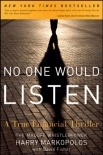No One Would Listen: A True Financial Thriller, Harry Markopolos [graded readers .TXT] 📗

- Author: Harry Markopolos
Book online «No One Would Listen: A True Financial Thriller, Harry Markopolos [graded readers .TXT] 📗». Author Harry Markopolos
Admittedly, I had some reservations. While I admired Spitzer for what he’d accomplished as the attorney general, I was also aware from my own research that his family had invested heavily in hedge funds and that he was a trust fund baby. It was quite possible that he was a Madoff investor and even more probable that he knew Madoff. In fact, I thought that was likely, as they were both members of the wealthy Jewish community in New York City. For all I knew they might even attend the same prestigious synagogue. So I knew it was a big risk for me. But I had to do something, and Spitzer appeared to me to be honest and ambitious. He was in the perfect position to initiate an investigation of Madoff. And the headlines he would earn by exposing him could make his political career.
The safest thing to do, I decided, was to get this information to him anonymously. I had identical twin sons due to be born in just a few months, and those boys were going to need a father. It wasn’t just my wife and me; now I had a family to think about.
I took a lot of precautions. In retrospect, I suppose, it may seem like I was overly cautious, but that’s only in retrospect. At the time all I knew for certain was that when our investigation was made public, many thousands of lives were going to be changed—and not one of them for the better. I certainly wasn’t looking for personal credit. I was hoping for justice.
I started by printing out my entire submission on clean sheets of paper, taking out my name or any information that could identify me. I made certain I didn’t leave any fingerprints on those pages. I put on a pair of gloves and slipped the submission into a 9 × 12 manila envelope and wrote Spitzer’s name on it. Then I slipped that inside a larger 10 × 13 envelope. I was ready to hand it off.
It was cold that December night. I put on extra-heavy clothing and the biggest coat I owned. I was careful to dress down; I didn’t want anyone to notice me. I sat quietly for Spitzer’s speech. When he was done, as he stood near the podium speaking personally to members of the audience, I put on my coat and my gloves as if I was ready to go out into the cold, then walked to the front of the room. A library staff member was standing a few feet away from Spitzer. I took the 9 × 12 envelope out of the larger envelope and handed it to her. “Would you do me a favor, please?” I asked. “Could you please make sure Mr. Spitzer gets this?”
“Of course,” she said.
“It’s important,” I added. Then I turned around and walked out into the blackness of a cold wintry night.
There is no evidence that Eliot Spitzer ever read my submission. I don’t even know for sure that he got it. But he never acted on it. Maybe this was a tactical error on my part. I should have realized that few people take anonymous submissions seriously. Perhaps if I had walked up to him and looked him in the eyes and said, “Mr. Attorney General, my name is Harry Markopolos. I’m president of the four-thousand-member Boston Security Analysts Society, and I have evidence here of the largest fraud in history,” and handed the envelope to him, he might have taken it seriously. But I did what seemed safest at that time.
Slightly more than three years had passed since we had discovered Madoff. We had compiled a strong case against him. Our original reason for trying to bring him down—that he was competition we couldn’t compete against—had ended with the failure of the Rampart Options Statistical Arbitrage strategy. But we were so deeply into this thing that it became impossible to put it down. We had actually developed into a pretty good team. We had two investigators in the field, Frank and Mike, and two quants in Neil and me able to find the defects in the materials they collected.
And they did continue to add to our growing pile of evidence. Frank’s new job at Benchmark Plus caused him to spend most of his time with hedge fund and risk managers, and at some point in each conversation he never failed to ask them, “What do you know about Bernie?” As he remembers, “I was in their office talking about other things but eventually we’d start talking about the industry in general and the rates of return in the marketplace, and I would ask them what they knew about Bernie. I wouldn’t even have to use his last name. They knew Bernie. Most of them told me, ‘I got money with Bernie,’ or ‘I know somebody who has money with him,’ or ‘This fund is raising a lot of money for Bernie.”’
At least several of those funds had ceased operating as traditional hedge funds and had become nothing more than Madoff’s sales force. They did nothing for their clients except shovel the money directly to Madoff. They didn’t do any due diligence, they didn’t make any other investments, and they certainly did not diversify to protect their clients’ money. Instead, they thought they had the deal of the century. They raised money and handed it to Bernie,





Comments (0)